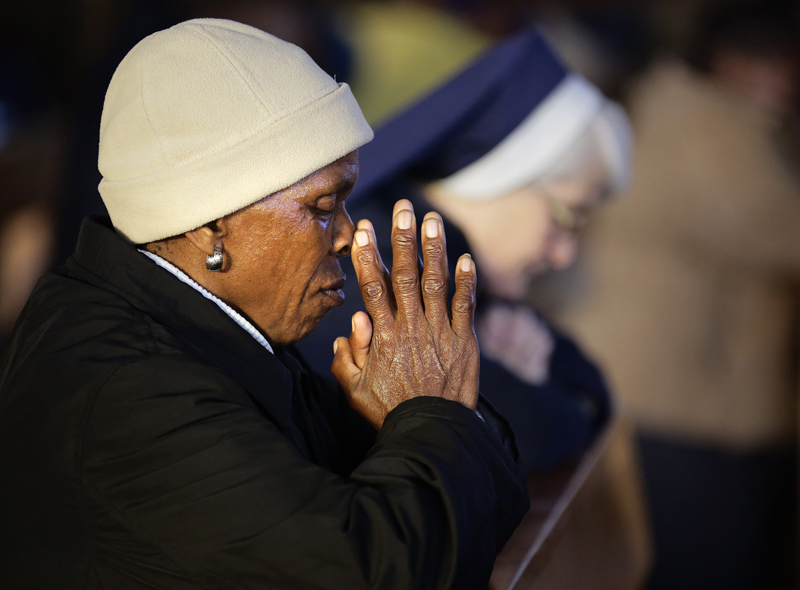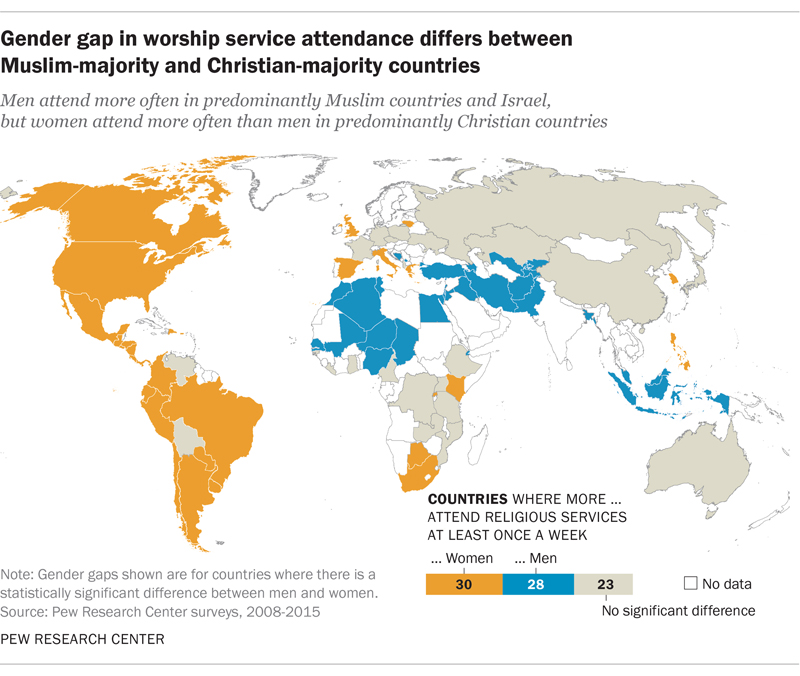
Gender gap in worship attendance differs between Muslim-majority and Christian-majority countries. Graphic courtesy of Pew Research Center
(RNS) Fewer men than women show up in U.S. churches, and women are markedly more likely to pray and to hold up religion as important.
But in Muslim nations, it’s the women who are missing in action at the mosque — and yet they’re on par with men in upholding almost all the Muslim pillars of faith.
Those are among the top findings in a new Pew Research study of the gender gap in religion, drawn from data in 192 nations, released Tuesday (March 22).
RELATED STORY: The US: One nation not quite under God
The overall conclusion: Women, particularly Christian, are generally more religious than men worldwide. An estimated 83 percent of women around the world identify with a faith group, compared with 80 percent of men, according to the report.
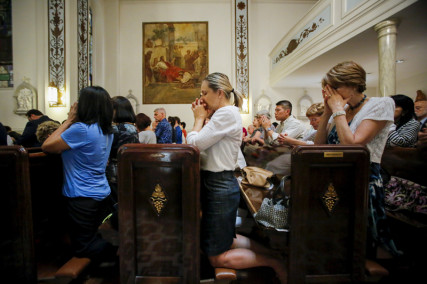
People pray while they attend the last Mass at Church of Our Lady of Peace in New York on July 31, 2015. Photo courtesy of REUTERS/Eduardo Munoz
*Editors: This photo may only be republished with RNS-GENDER-RELIGION, originally transmitted on March 22, 2016.
That’s not a conclusion people could reach by observation, say demographer Conrad Hackett and senior writer and editor Caryle Murphy, co-authors of the report.
“If you were a Christian woman in Kansas and you and your husband both go to church, you might think men and women are equally religious,” said Murphy.
That’s not so, she said. “We pray more than our male peers, we attend church more and we are more likely to say our religion is important to us,” she said.
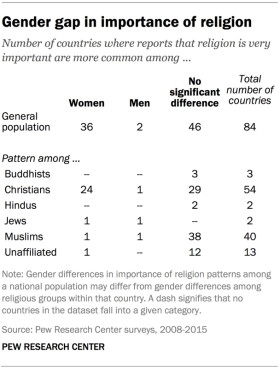
Gender gap in importance of religion. Graphic courtesy of Pew Research Center
This same hypothetical American might also want to know about a Muslim neighbor down the street “who belongs to a faith where men and women are very much alike in their commitment,” said Murphy.
The only exception for Muslims, who make up 23 percent of the world population, is that men attend mosque more than women, said Hackett.
RELATED STORY: The future map of religions reveals a world of change for Christians, Muslims and Jews
Among the findings:
- In 61 of 192 countries studied, women are more likely than men to claim a religious identity. “There’s not always a huge difference but when there is a difference, it always favors women,” said Hackett.
- The nones — people with no self-identified religious affiliation — are more likely to be men: 55 percent to 45 percent for women.
- Religiosity lessens among Christian women as they move up the economic ladder.
Overall, however, the report, mapping prayer, affiliation and importance of religion across the globe in deep detail, does not explain why there is a gap between — and within — the genders.
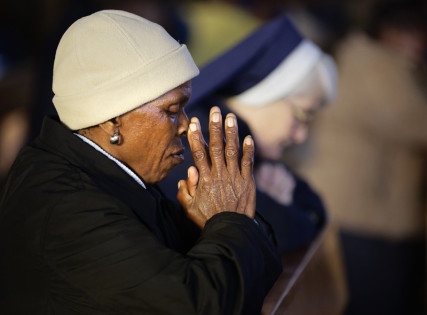
A woman and a nun pray during an early morning Mass at Regina Mundi Church in Soweto, South Africa, on June 30, 2013. Photo courtesy of REUTERS/Kevin Coombs
*Editors: This photo may only be republished with RNS-GENDER-RELIGION, originally transmitted on March 22, 2016.
Unanswered questions examined in the report include the age-old argument of whether nature or nurture can account for it, and how much theology, economics and majority or minority status by race or religion make a difference within and between genders.
RELATED STORY: Losing their religion: More women join the unspiritual set
Christian women in the United States, for example, may become less religious as their own paychecks climb because they get less affirmation from religious congregations that honor women in traditional family-centered roles, said Indiana University sociologist Landon Schnabel, an adviser to Pew Research on this survey.
His research found that high-earning white Christian women (over $100,000 a year in personal income) are no more religious than high-earning men.
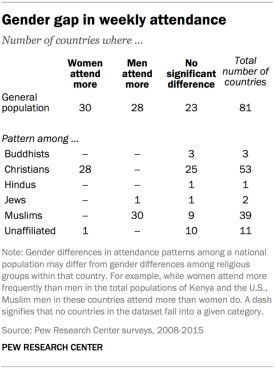
Gender gap in weekly attendance. Graphic courtesy of Pew Research Center
Theology may undergird the differences between men and women in Christianity, said Linda Woodhead, professor in the department of politics, philosophy and religion at Lancaster University.
“Christianity is a highly feminized religion: Jesus is not at all macho, unlike Muhammad,” said Woodhead, who sees this as “a problem for men” that other major religions do not share.
But as Christian women move out of traditional support roles in the home and in the church and insist on equity in society, the problem will grow for churches that “defend male leadership, the nuclear family and traditional gender roles,” she said, looking at her research in the United Kingdom.
She cited “extensive interviews in which I kept coming across women struggling to make sense of how they could be Christian and self-developing individuals. Their daughters didn’t struggle, they just gave up a church which no longer spoke to their condition, just like their brothers.
Kecia Ali, an associate professor of religion at Boston University, when told about the Pew findings, observed that “most Muslims hold that attendance at Friday midday communal prayer is obligatory for men but merely encouraged or simply permissible for women.
“But whether women actually go to mosques varies greatly depending on local norms, and those are in flux. For instance, one thing that’s shifted in Egypt over the last 30 years of religious revival there is a dramatically increased presence of women in mosques,” said Ali, author of “Sexual Ethics and Islam.”
The Pew gender gap report was based on examining Christians, Muslims, Buddhists, Hindus, Jews and the unaffiliated (nones) in data from censuses, demographic surveys and population surveys conducted in the last seven years.
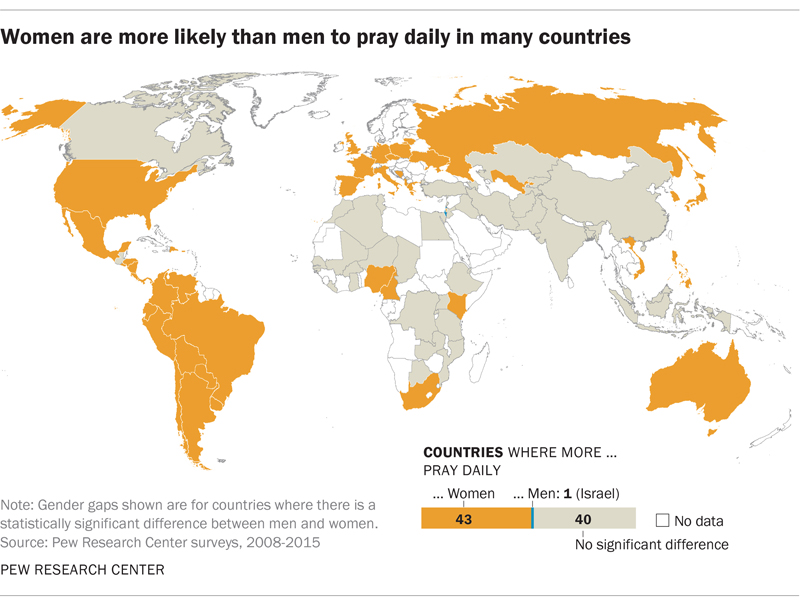
Women are more likely than men to pray daily in many countries. Graphic courtesy of Pew Research Center
(Cathy Lynn Grossman is senior national reporter for RNS)
